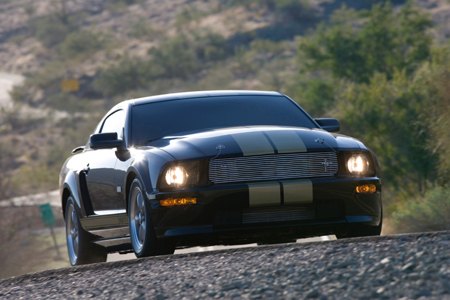Fleeting Glory
The New York Times recently labelled GM a crack dealer for using $1000 gas cards to "addict" Californian drivers to its gas-guzzling SUV's. There are several important differences between selling a Schedule II substance to low-income drug addicts and marketing a legal product to responsible consumers in a free market. Suffice it to say, the Gray Lady's got it backwards: GM is the addict. The General is hopelessly addicted to fleet sales. Although GM has publicly announced its intention to reduce their reliance on this part of their business, it's nothing more than a junkie's promise to reform. In fact, none of the Big Three are ready, willing or able to leave their dependency behind.
There are two kinds of fleet sales: organizational and rental. In both cases, profit margins are minuscule. Manufacturers aren't overly concerned. They rely on the huge orders to increase production levels; which keep factories open, sudsidize union salaries and reduce a given model's cost-per-unit (CPU). A low enough CPU creates higher profit margins on the model's "regular" (i.e. retail) sales. The enormous volumes also facilitate all-important 'top sales' bragging rights and protect the manufacturer's Holy Grail: market share.
Selling cars to government agencies, schools, taxi firms and private companies is a slam dunk. Few local politicians or business owners want to risk ticking-off powerful [union] constituencies by buying foreign– unless the local car plant is foreign-owned. (And maybe not even then.) But the rental market is the big score: hundreds of thousands of vehicles per year. What's more, rental "sales" are actually short-term leases (usually six months). The numbers can be massaged to look even better if, say, you own the rental car company. When Ford owned Hertz, they offered themselves some mighty impressive deals; like four-month leases. That sort of turnover has an extremely salutary effect on a manufacturer's production figures.
On a balance sheet, there's nothing wrong with selling cars to yourself. From a long-term perspective, the damage is both massive and relentless. For one thing, rental cars don't disappear when their owners are finished. When "lightly used" rental cars flood the market, the vast supply of relatively low-mileage, good quality vehicles crater the model's resale value. The resulting depreciation hits retail customers hard– especially brand or model loyal buyers that trade-in their vehicle every three to five years. The chronic over-supply also reduces the possibility and profitability of competitive leasing.
The second effect is more insidious, but more dangerous: the "cheapening" of the model's name. Our old friend the Ford Taurus is a textbook example. Even before the model's "ovalization," Ford used Taurus sales to Hertz to secure the "top selling car in America" trophy. Without an inside line to a rental company, Honda and Toyota simply couldn't compete. Eventually, both automakers gave up trying; Honda made the US Accord a separate model and moved in the TL (which reduced their output enough to stay out of the running). Toyota simply bided their time, and moved further up-market.
As Mary Walton details in her book "Car", the '93 Taurus wasn't designed to out-sell Camry (mission accomplished). The new Taurus was supposed to "beat Camry" in the upper middle market. While the Taurus' execution wasn't flawless (the design was certainly challenging), its rental car reputation was the single greatest obstacle to moving the model up-market. The sort of people who would pay a premium for a premium sedan didn't even have the Taurus on their radar. Eventually the Taurus survived only to provide marginally profitable fleet sales; the retail market was practically non-existent.
General Motors also knows the drill. Many of their least inspiring models– Impala, G6, Malibu– find their primary home inside rental fleets. Their success in this less-demanding environment removes the incentive to upgrade the vehicles to compete in new car showrooms. Once the general public perceives a vehicle as a rental car, once they clock the depreciation, it's doomed. Although sales volumes indicate a winner, the rental fleets lock the models into a Taurus-like death spiral. GM claims it wants to reduce these sales, but in truth, they will have to go through a slow withdrawal. Going cold turkey on 25% of their business would be fatal.
There's no easy way for The Big Three to wean off themselves off fleet sales. One solution: design models specifically for rental fleets (the old Malibu was held over as the "Classic" for this very reason). Meanwhile, restricting fleet sales to a small percentage of retail sales is the only viable option. The move would help sustain their models' retail and resale values and increase the pressure to constantly and consistently improve their products. The Big Three say they're moving in that direction. But what are the chances struggling domestic automakers will resist the temptation to use fleet sales as a quick "fix" for slumping market share?
More by Andrew Dederer
Latest Car Reviews
Read moreLatest Product Reviews
Read moreRecent Comments
- Bill Wade I think about my dealer who was clueless about uConnect updates and still can't fix station presets disappearing and the manufacturers want me to trust them and their dealers to address any self driving concerns when they can't fix a simple radio?Right.
- FreedMike I don't think they work very well, so yeah...I'm afraid of them. And as many have pointed out, human drivers tend to be so bad that they are also worthy of being feared; that's true, but if that's the case, why add one more layer of bad drivers into the mix?
- ChristianWimmer I have two problems with autonomous cars.One, I LOVE and ENJOY DRIVING. It’s a fun and pleasurable experience for me. I want to drive my cars, not be driven by them.Two, if autonomous cars have been engineered to a standard where they work 100% flawlessly and don’t cause accidents, then freedom-hating governments like the POS European Union or totally idiotic current German government can literally make laws which ban private car ownership in their quest to save the world from climate change bla bla bla…
- SCE to AUX Everything in me says 'no', but the price is tempting, and it's only 2 hours from me.I guess 123k miles in 18 years does qualify as 'low miles'.
- Dwford Will we ever actually have autonomous vehicles? Right now we have limited consumer grade systems that require constant human attention, or we have commercial grade systems that still rely on remote operators and teams of chase vehicles. Aside from Tesla's FSD, all these systems work only in certain cities or highway routes. A common problem still remains: the system's ability to see and react correctly to obstacles. Until that is solved, count me out. Yes, I could also react incorrectly, but at least the is me taking my fate into my own hands, instead of me screaming in terror as the autonomous vehicles rams me into a parked semi


































Comments
Join the conversation